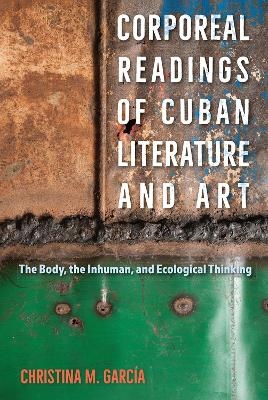
Corporeal Readings of Cuban Literature and Art
The Body, the Inhuman, and Ecological Thinking
Seiten
2024
University Press of Florida (Verlag)
978-1-68340-433-0 (ISBN)
University Press of Florida (Verlag)
978-1-68340-433-0 (ISBN)
- Titel z.Zt. nicht lieferbar
- Versandkostenfrei innerhalb Deutschlands
- Auch auf Rechnung
- Verfügbarkeit in der Filiale vor Ort prüfen
- Artikel merken
Examines Cuban literature and art that challenges traditional assumptions about the body. Examining how writers and artists have depicted racial, gender, and species differences throughout the past century, Christina Garcia identifies historical continuities in the way they have emphasized the shared materiality of bodies.
Tracing corporeality and materiality across Cuban texts and images of the twentieth century
This volume looks at Cuban literature and art that challenges traditional assumptions about the body. Examining how writers and artists have depicted racial, gender, and species differences throughout the past century, Christina García identifies historical continuities in the way they have emphasized the shared materiality of bodies.
García shows how these works interact with ecologies of the human and nonhuman across diverse media, time periods, and ideologies.
García examines corporeality in a variety of works, including the poetry of Nicolás Guillén and experimental writings of Severo Sarduy; transspecies drawings, paintings, and sculptures by Roberto Fabelo; Tomás Gutiérrez Alea’s popular queer film Fresa y chocolate; and contemporary narrative fictions by Ena Lucía Portela, Antonio José Ponte, and Ahmel Echevarría. Using the lenses of new materialism, critical race studies, critical animal studies, queer studies, and poststructuralism, García engages with Cuban cultural production at the intersection of diverse social issues.
In this book, García explores how certain artistic practices focus on portraying ecological relationships instead of recognizable subjects or shared identity. Corporeal Readings of Cuban Literature and Art demonstrates that through their attention to the connections that different kinds of bodies share, Cuban creators have long undermined rules of classification and unification, reimagining community as shared vulnerability and difference.
Publication of this work made possible by a Sustaining the Humanities through the American Rescue Plan grant from the National Endowment for the Humanities.
Tracing corporeality and materiality across Cuban texts and images of the twentieth century
This volume looks at Cuban literature and art that challenges traditional assumptions about the body. Examining how writers and artists have depicted racial, gender, and species differences throughout the past century, Christina García identifies historical continuities in the way they have emphasized the shared materiality of bodies.
García shows how these works interact with ecologies of the human and nonhuman across diverse media, time periods, and ideologies.
García examines corporeality in a variety of works, including the poetry of Nicolás Guillén and experimental writings of Severo Sarduy; transspecies drawings, paintings, and sculptures by Roberto Fabelo; Tomás Gutiérrez Alea’s popular queer film Fresa y chocolate; and contemporary narrative fictions by Ena Lucía Portela, Antonio José Ponte, and Ahmel Echevarría. Using the lenses of new materialism, critical race studies, critical animal studies, queer studies, and poststructuralism, García engages with Cuban cultural production at the intersection of diverse social issues.
In this book, García explores how certain artistic practices focus on portraying ecological relationships instead of recognizable subjects or shared identity. Corporeal Readings of Cuban Literature and Art demonstrates that through their attention to the connections that different kinds of bodies share, Cuban creators have long undermined rules of classification and unification, reimagining community as shared vulnerability and difference.
Publication of this work made possible by a Sustaining the Humanities through the American Rescue Plan grant from the National Endowment for the Humanities.
Christina M. García is assistant professor of Spanish at the College of Charleston.
| Erscheinungsdatum | 21.08.2024 |
|---|---|
| Zusatzinfo | 8 colour and 2 b&w illustrations |
| Verlagsort | Florida |
| Sprache | englisch |
| Maße | 152 x 229 mm |
| Gewicht | 272 g |
| Themenwelt | Kunst / Musik / Theater ► Kunstgeschichte / Kunststile |
| Geisteswissenschaften ► Geschichte ► Regional- / Ländergeschichte | |
| Geisteswissenschaften ► Sprach- / Literaturwissenschaft ► Anglistik / Amerikanistik | |
| Geisteswissenschaften ► Sprach- / Literaturwissenschaft ► Literaturwissenschaft | |
| ISBN-10 | 1-68340-433-5 / 1683404335 |
| ISBN-13 | 978-1-68340-433-0 / 9781683404330 |
| Zustand | Neuware |
| Informationen gemäß Produktsicherheitsverordnung (GPSR) | |
| Haben Sie eine Frage zum Produkt? |
Mehr entdecken
aus dem Bereich
aus dem Bereich
Erinnerungen
Buch | Softcover (2024)
Pantheon (Verlag)
16,00 €
Universalgelehrter, Polarreisender, Entdecker
Buch | Hardcover (2024)
mareverlag
28,00 €


